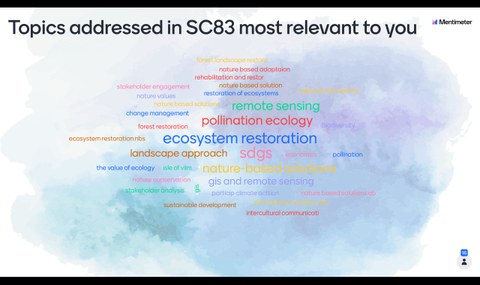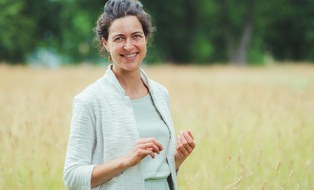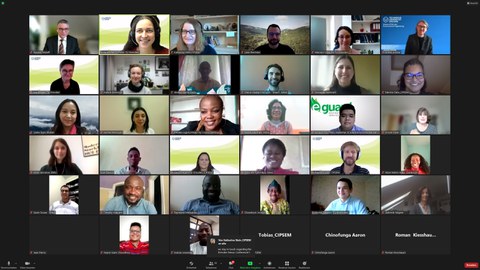Dec 15, 2021
Connecting the world for a "Green Recovery"

Most relevant course aspects of the participants.
In line with the Sustainable Development Goal (SDG) 15 (Life on land) the 83rd UNEP/UNESCO/BMU International Short Course on Ecosystem Restoration Towards a Green Recovery at the Centre for International Postgraduate Studies of Environmental Management (CIPSEM) contributes to building up capacities to monitor ecosystem degradation and biodiversity loss and its consequences for ecosystem resilience and human livelihoods. The advanced training course addressed aspects of biodiversity conservation, agri-food systems, adequate legal provisions, robust political requirements, and suitable technologies for ecosystem restoration in a holistic anthropocentric view. The course focused on a sound understanding of the role of biodiversity for ecosystem functioning and the provision of ecosystem services (such as pollination) and goods (One-Health Approach), and elaborated case studies on different restoration approaches in different biomes and socio-ecological systems.
In this context, the course also addressed SDG 12 (Responsible Consumption and Production) - consumption and production of all goods and services require the transformation of many natural resources, which in turn affects biodiversity. The production and extraction of agricultural goods, forest products, energy, and minerals alter landscapes and natural systems across the planet and support the livelihoods of billions of people. These land-use decisions are driven in large part by local and distant consumer behaviour and preferences. Therefore, efforts under SDG 12 have a central role to play in developing land restoration strategies that acknowledge the complexity and interconnectedness of resource availability and demand to effectively address the critical drivers of land-use change.
For the most effective implementation of the SDGs, a holistic and cross‐sectoral approach to fostering bio‐based solutions is crucial. Accelerating work in this area is a key requirement for sustainable development. Another part of the course highlighted bio-based solutions and dealt with sustainable consumption and production patterns along the entire value chain. Particular attention was raised towards the question of how to reduce the economic reliance on inefficient and destructive measures, and how to achieve sustainable development through the sustainable use of biodiversity’s economic potential.
Part three of the course provided insights into aligning stimulus or other economic packages to avoid post-COVID-19 lock-in effects in non-sustainable structures. The course contributed towards a new understanding of the impact of green recovery measures (“Build Back Better”) on employment, economic growth, and social inequality and how to incorporate specific policies into tax and macro-financial packages.
21 participants from 16 countries also developed their respective post-training action plans within their scope of work, applying the course contents and considering inspiration received from facilitators and fellows during the course. This plan shall be implemented autonomously upon return and facilitate the transfer of the newly acquired knowledge into the day-to-day activities.
The course virtually concluded Friday, December 10th, 2021 with representatives from Federal Ministry for the Environment, Nature Conservation, Nuclear Safety and Consumer Protection (BMU), Federal Agency for Nature Conservation (BfN), Partnership for Action on Green Economy (PAGE), United Nations Institute for Training and Research (UNITAR), Technische Universität Dresden (Chief Officer Technology Transfer and Internationalisation, facilitators), contributors, alumni, guests, friends, and the CIPSEM team and was another prime example of the still necessary but nevertheless successful change into a digital course environment across 12 time zones.
Contact:
 © get-shot.de
© get-shot.de
Dr. Anna Görner
Course Director
Send encrypted email via the SecureMail portal (for TUD external users only).
Visiting address:
Zellescher Weg 41c, Raum 110
01217 Dresden

